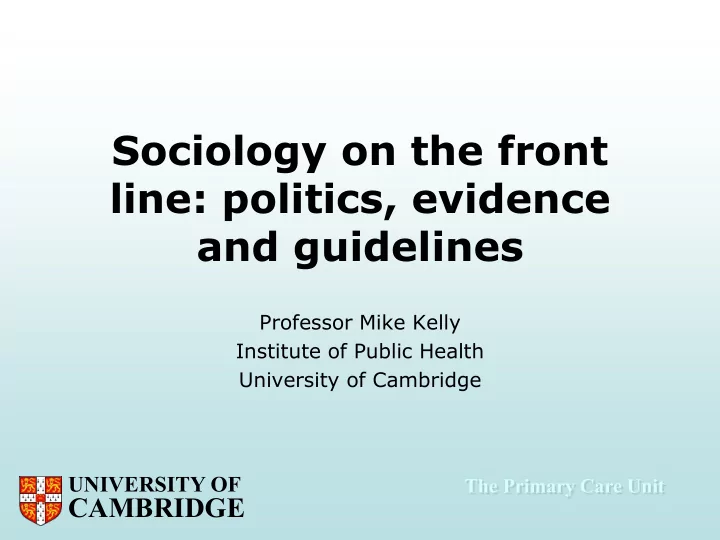

Sociology on the front line: politics, evidence and guidelines Professor Mike Kelly Institute of Public Health University of Cambridge UNIVERSITY OF The Primary Care Unit CAMBRIDGE
NICE The National Institute for Health and Care Excellence (NICE) is the independent organisation in the UK responsible for providing national guidance to the NHS and the wider public health community on the promotion of good health and the prevention and treatment of ill health. UNIVERSITY OF The Primary Care Unit CAMBRIDGE
• Ministers including Secretaries of State. • Politicians. • Officials. • Media. • Local authorities. • Public health practitioners. • Vested interests. • Researchers. UNIVERSITY OF The Primary Care Unit CAMBRIDGE
The task for pubic health at NICE from 2005 • To apply the principles of Evidence Based Medicine (EBM) to public health. UNIVERSITY OF The Primary Care Unit CAMBRIDGE
The task from 2005 • To apply the principles of EBM to public health. • To develop the methods to do so. UNIVERSITY OF The Primary Care Unit CAMBRIDGE
The process • Evidence review. – Broad inclusive searches. – Pluralistic approach to evidence. • Evidence appraisal. – Quality of the evidence not the quality of the method. – Does it help answer the question? • Judgements made about the evidence. – Empirical judgments – Rationalist judgments. UNIVERSITY OF The Primary Care Unit CAMBRIDGE
Assessing cost -effectiveness UNIVERSITY OF The Primary Care Unit CAMBRIDGE
Assessing Cost Effectiveness 1 Probabilit y of rejection 0 50 10 20 30 40 UNIVERSITY OF The Primary Care Unit CAMBRIDGE Cost per QALY (£K)
Assessing health inequalities. UNIVERSITY OF The Primary Care Unit CAMBRIDGE
The health gradient Hi Health state Lo Lo Hi UNIVERSITY OF The Primary Care Unit Social status CAMBRIDGE
UNIVERSITY OF The Primary Care Unit CAMBRIDGE
The health gradient Hi Health state Lo Lo Hi UNIVERSITY OF The Primary Care Unit Social status CAMBRIDGE
The health gradient Hi Health state Lo Lo Hi UNIVERSITY OF The Primary Care Unit Social status CAMBRIDGE
Shifting the health gradient Hi Health state Lo Lo Hi UNIVERSITY OF The Primary Care Unit Social status CAMBRIDGE
• Theoretical and empirical dimensions of the contours and dimensions of inequality not well described – the axes of differentiation and their intersection completely missing from the evidence base. UNIVERSITY OF The Primary Care Unit CAMBRIDGE
• The ways in which interventions work in different segments of the population not well understood UNIVERSITY OF The Primary Care Unit CAMBRIDGE
Politics and evidence. UNIVERSITY OF The Primary Care Unit CAMBRIDGE
The Mintzberg Dilemma UNIVERSITY OF The Primary Care Unit CAMBRIDGE
The Jowett Dilemma UNIVERSITY OF The Primary Care Unit CAMBRIDGE
UNIVERSITY OF The Primary Care Unit CAMBRIDGE
UNIVERSITY OF The Primary Care Unit CAMBRIDGE
“ First come I; my name is Jowett. There’s no knowledge but I know it. I am master of this college: What I don’t know isn’t knowledge .” The Masque of Balliol Revd. H.C. Beeching UNIVERSITY OF The Primary Care Unit CAMBRIDGE
Institutional resistance • Change only possible at the margin. • Resources. • Habitual decision making. • Power. • Reductionism and behaviour change. UNIVERSITY OF The Primary Care Unit CAMBRIDGE
Alcohol • NICE (2010) Alcohol use disorders: preventing harmful drinking , London: NICE. www.nice.org.uk/PH24 UNIVERSITY OF The Primary Care Unit CAMBRIDGE
Recommendations price • availability • marketing • screening and brief interventions • UNIVERSITY OF The Primary Care Unit CAMBRIDGE
“Government rejects health watchdog's alcohol policy” The Independent Wednesday 02 June 2010 UNIVERSITY OF The Primary Care Unit CAMBRIDGE
A non dialogue between evidence producers and policymakers • Academic concerns with the integrity of the science. • Lengthy gestation. • “Need more research”. • Definition of the problem. • The policy needs of the moment. • Policy questions seldom the same as scientific questions. • Political questions are foreshortened - three minutes to explain a complex idea UNIVERSITY OF The Primary Care Unit CAMBRIDGE
Conclusion. • From the Elizabethan Poor Law, through the Poor Law Amendment Act 1834, the Public Health Acts of the 1870s, the National Insurance legislation of Lloyd George, the establishment of the Welfare State and to every attempt at reform thereafter four problems appear and reappear:- UNIVERSITY OF The Primary Care Unit CAMBRIDGE
• Central versus Local administration. • Voluntary/ Permissive versus compulsion. • How to fund it. • “The poor are always with us” - health inequalities. It is not clear that all our evidence helps answer these questions which in the end are ultimately political and are the stuff of public interest and media comment and engagement. UNIVERSITY OF The Primary Care Unit CAMBRIDGE
Recommend
More recommend